About the Orphans
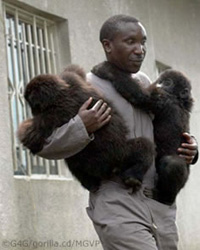
The Senkwekwe Centre is home to four mountain gorilla orphans. Each has a sad story behind becoming an orphan but they are all now thriving.
They happily spend their days as a tight knit family group in their forested enclosure at the Centre with their 24/7 team of carers led by Andre.
They happily spend their days as a tight knit family group in their forested enclosure at the Centre with their 24/7 team of carers led by Andre.
Kaboko
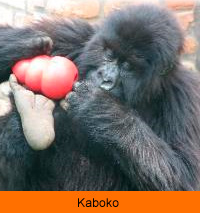
Kaboko was originally from Virunga National Park. He had been confiscated in Gisenyi, the border town between Rwanda and DR Congo, in March 2007. He was around 3.5 years old. Captured by poachers he had a snare tightly wrapped around his right wrist. On inspection by the Gorilla Doctors, it was decided that there was no option but to amputate his hand. Kaboko recovered at the Gorilla Doctors orphan gorilla facility at Kinigi, Rwanda. He appeared depressed and aloof for a considerable time, preferring his own company but after a year at the facility he started to seek the friendship of his keepers and fellow gorilla orphans. Kinigi was then home for 8 orphan gorillas; six eastern lowland gorillas and the seventh was Maisha, a female orphan mountain gorilla originally from Virunga.
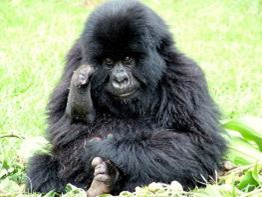
He and Maisha were transferred to the Senkwekwe Centre at Rumangabo, in 2010, to live alongside the other two mountain gorilla orphans, Ndeze and Ndakasi. Kaboko was always the mischievous, boisterous teenager as you might expect from a young male gorilla. Older Maisha often protected the two much younger gorillas from his antics. In the middle of the terrible fighting between M23 rebels and the Congolese army that swamped Rumangabo in July 2012, the news came that Kaboko had died. He suffered bad gastro-intestinal problems and whilst the vets and carers at the Senkwekwe Centre had tried everything to help him, he sadly passed away. He had been severely traumatised by the sound of bombs and gunfire and that had probably weakened his immune system. We should remember that Kaboko had really blossomed in his new home, thoroughly enjoying being part of his very special gorilla family at the Senkwekwe Centre. Chief carer, Andre, was devastated to lose him, as were we all. Rest in peace Kaboko.
Ndakasi
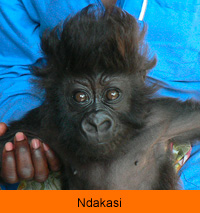
Ndakasi’s story is an amazing one. She survived against all the odds after immeasurable care and nurturing from the Gorilla Doctors. She was born on April 17th 2007 and was named after park ranger Benjamin Ndakasi Lola who has passed away earlier that year. In June, less than 2 months old, Ndakasi lost her mother Nsekuye, who was shot, execution style, in the back of the head for no apparent reason. Bananas were found scattered nearby, so her attackers deliberately lured her within range. Nsekuye was the largest female in the Kabirizi group, mother to four youngsters and a very calm gorilla. Her relaxed nature made her killing all the more keenly felt, as she may well not have offered any resistance to her killer(s). At between just 8-10 weeks of age, Ndakasi was found still clinging to her mothers’ body. Weak and severely dehydrated from not being able to suckle, ranger Andre Bauma scooped her up and held her close to him for warmth. Once he emerged with her from the forest, she was taken swiftly to the city of Goma, where she would inevitably have to be hand reared.
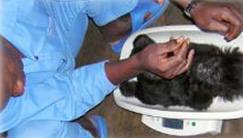
After initially responding well to milk feeds and warmth from her foster parent Andre, she suddenly took a turn for the worse, with her oxygen levels falling dangerously low. It was probable that she had picked up an infection from one of the humans who had rescued her.
She developed severe pneumonia. She was very tiny, 18 inches long and weighing around 5 and a half pounds. The Gorilla Doctors feared for her survival.

The local United Nations hospital and doctors gave crucial help at this point, providing oxygen and some adapted apparatus through which to supply it to her. As medical facilities and supplies for the local people was not exactly in plentiful supply, this generous intervention for Ndakasi was vital and literally saved her life. Thanks to the UN staff and the Gorilla Doctors, Ndakasi’s oxygen levels steadily rose and she even woke up to take half a bottle of milk, later the same day.
Ndakasi stayed in Goma with another orphan Ndeze until they were transferred to the new Senkwekwe Centre in Virunga National Park in December 2009. Today, she is a strong healthy 8 year old, best friends with her playmate Ndeze and full of mischief – as she should be.
Ndeze
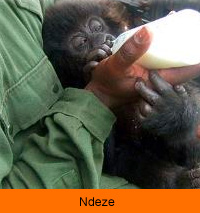
Ndeze was born on February 17th 2007 into the Rugendo family. Her birth to mother Safari was celebrated and beamed around the world as only a month earlier the Park had made headlines when rebel soldiers killed 2 mountain gorillas. Sadly, just five months later, Safari featured in the news again as one of those massacred on one of Virunga’s darkest days. On 22nd July, Safari was shot dead along with several other members of the Rugendo group. The slaughter of so many of this well-known gorilla family shocked the world. The reason for the killings was thought to be connected to the illegal charcoal trade within the Park. It may have been a warning to the rangers who were systematically destroying the charcoal kilns. Safari was always quite vocal when being approached, even by rangers and trackers that she knew, so she would have tried to warn the rest of the group.
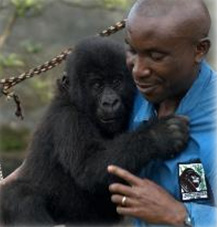
The great silverback and Ndeze’s father, Senkwekwe, also perished that day after almost certainly putting up a tremendous fight to protect his family. The orphan facility in Virunga is named in his honour.
Little Ndeze was picked up by one of her elder brothers, blackback Mukunda, and carried her away into the forest. Her brother showed such bravery as he instinctively tried to protect her from danger but gorilla babies need to suckle for three years, so she wouldn’t have survived. After careful planning and tracking, the rangers and Gorilla Doctors darted Mukunda briefly, to allow them to retrieve little Ndeze.
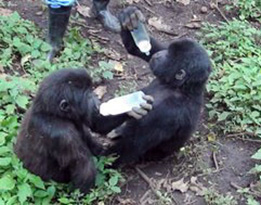
With the expert care of the Gorilla Doctors and ranger carers, Ndeze has grown into a healthy, strong youngster. She grew up with little Ndakasi, orphaned a month before her, in Goma until being transferred to the Senkwekwe Centre in December 2009. The two have continued to be inseparable.
Maisha
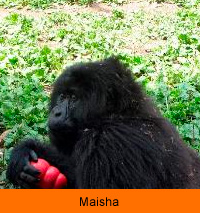
Born in Virunga in 2001, Maisha entered her forest world when there was lots of rebel group activity within the Park and the forest was being cleared wholesale for farmland. She was poached early December 2004 and taken across the border into Rwanda. Kept in a cave, she was only given occasional corn and sugar cane. Rumours about her reached the Rwandan Park Authority and on December 18th that year, together with Rwandan police, they rescued her. She was very thin and malnourished. She was cared for by the Gorilla Doctors and ranger carers and soon regained her weight with good food. Maisha has always been a very calm gorilla and has a close bond with humans. In 2006, the Gorilla doctors were able, with partners, to open a gorilla orphan facility at Kinigi in Rwanda. Maisha was moved there to eventually be with mountain gorilla orphan Kaboko and six eastern lowland gorilla orphans. She was one of the two oldest gorillas at the facility and continued to be a calming influence on the group – except at meal times when she was very protective of her food. On 23rd November 2010, Maisha was transferred with Kaboko to the Senkwekwe Centre in Virunga – back to the country from which they came. Introducing these two new, older gorillas to Ndeze and Ndakasi would be interesting. The new arrivals were put into an enclosure next to the youngsters who immediately began to watch them intently. Over a period of a few weeks the four were slowly introduced to each other until the new gorilla ‘family’ was formed.
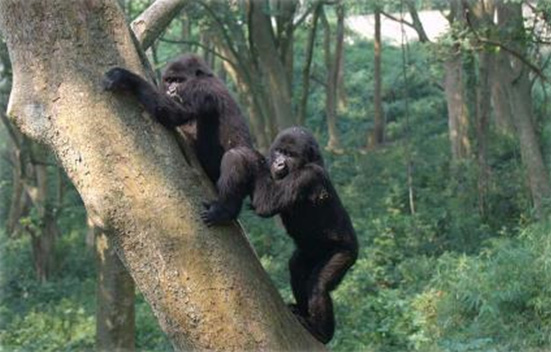
Although she has never raised her own offspring, Maisha took on the role of ‘big sister’ to Ndeze and Ndakasi quite naturally, protecting them from the rowdy antics of the orphan male Kaboko. Currently 14 years old, Maisha is the matriarch of the group. To this day however, she remains very defensive about food.
Matabishi
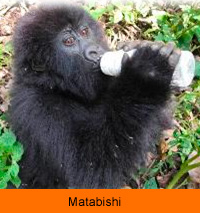
Little Matabishi was found alone in a cornfield outside Virunga National Park in late June 2013. Someone from a nearby village alerted the rangers and once found they slept in the field with him until the Gorilla Doctors could effect a rescue on June 23rd.
He seemed in pretty good health apart from a large wound on his back (probably a rope restraint) and slight dehydration. His fur was matted from a lack of being groomed and he relished the company of people showing he’d unfortunately been in the company of humans for some time.
Dr Eddy of the Gorilla Doctors held Matabishi in his arms throughout the journey to the Senkwekwe Centre. The little one had obviously got well used to humans during his captivity although he had almost certainly been taken from a wild group of mountain gorillas and had probably seen his mother or other members of his family killed.
Once at the Centre Matabishi has a physical examination, samples were taken and vaccination jabs given. Ranger Innocent Mburanumwe, the Chief of Gorilla Monitoring in Virunga, had asked for the gorilla families that range close to where the little one was found to be checked. News came back that all of the Mapuwa and Lulengo groups were accounted for so the new arrival was called Matabishi which means ‘bonus’ in Swahili.
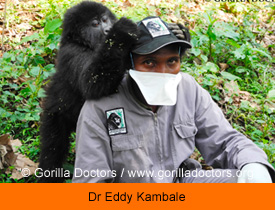
After a period of quarantine watched over by Dr Eddy (left), Matabishi was slowly introduced to the other orphans at the Centre.
Maisha, the eldest, took to mothering him remarkably quickly seeing as she has never has a baby of her own. Matabishi now had a very attentive foster mum and two foster sisters in Ndeze and Ndakasi.
They have continued to develop into a very close knit, happy family group at the Senkwekwe Centre.

